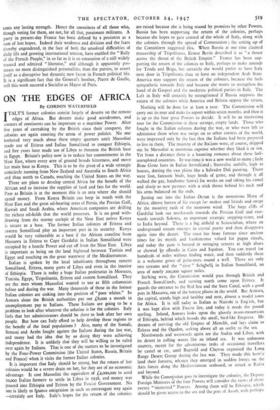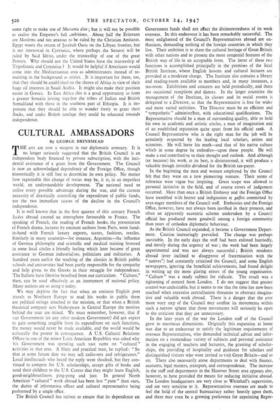ON THE EDGES OF AFRICA
By GORDON WATERFIELD
ITALY'S former colonies consist largely' of deserts on the remote edges of Africa. But deserts make good aerodromes, and corners of continents can be important to a maritime Power. After five years of caretaking by the British since their conquest, the colonies are again entering the arena of power politics. No one bothered very much about these empty quarters until Mussolini made use of Eritrea and Italian Somaliland to conquer Ethiopia, and five years later made use of Libya to threaten the British base in Egypt. Britain's policy now is to reduce her commitments in the Near East, where every acre of ground breeds bitterness, and move her main base to Kenya. This is to be the pivot of a wide strategic semicircle running from New Zealand and Australia to South Africa and then north to Canada, touching the United States on the way.
There are plans to develop central Africa for the benefit of the African and to increase the supplies of food and fats for the world. Poor as Britain is at the moment this is an area where she should spend money. From Kenya Britain can keep in touch with the Near East and the great oil-bearing areas of Persia, the Persian Gulf, Kuwait and Saudi Arabia, where American companies are drilling the richest oil-fields that the world possesses. It is no good with- drawing from the stormy cockpit of the Near East unless Kenya is secure as a base. The former Italian colonies of Eritrea and eastern Somaliland play an important part in its security. Kenya would be very vulnerable as a base if the African coastline from Massawa in Eritrea to Cape Gardafui in Italian Somaliland were occupied by a hostile Power and cut off from the Near East. Libya is important as being on the land highroad between Tunisia and Egypt and touching on the great waterway of the Mediterranean.
Italian is spoken by the local inhabitants throughout eastern Somaliland, Eritrea, many parts of Libya and even in the interior of Ethiopia. There is today a huge Italian proletariat in Morocco, Tunisia, Egypt, Tripolitania, Eritrea and eastern Somaliland. They are the men whom Mussolini wanted to use as fifth columnists before and during the war. Many thousands of these in the former Italian colonies are sinking into the position of "poor whites." In Asmara alone the British authorities pay out £6,000 a month in unemployment pay to Italians. These Italians are going to be a problem to look after whatever the solution is for the colonies. Italy feels that her administrators should be there to look after her own people. But how can Italy afford to help develop these regions to the benefit of the local populations ? Also, many of the Somali, Senussi and Arabs fought against the Italians during the last war, and many had the idea that by so doing they were achieving independence. It is unlikely that they will be willing to be ruled over again by Italians. That is one of the matters to be investigated by the Four-Power Commission (the United States, Russia, Britain and France) when it visits the former Italian colonies.
It is important that Italy should be strong, but the return of her colonies would be a severe drain on her, for they are of no economic advantage. It cost Mussolini the equivalent of £4,000,000 to send 20,000 Italian farmers to settle in Libya in 1938, and money was poured into Ethiopia and Eritrea by the Fascist Government. No one is likely to fiance emigration in such an extravagant way again —certainly not Italy. Italy's hopes for the return of the colonies are raised because she is being wooed by promises by other Powers. Russia has been supporting the return of the colonies, perhaps because she hopes to gain control of the whole of Italy, along with the colonies, through the spread of Communism ; the setting up of the Cominform suggested this. When Russia at one time claimed trusteeship of Tripolitania, Ernest Bevin described it as " a thrust across the throat of the British Empire." France has been sup- porting the return of the colonies to Italy, perhaps to make amends for Tenda and Briga, but certainly she would prefer to have Italy next door in Tripolitania than to have an independent Arab State. America may support the return of the colonies, because she feels sympathetic towards Italy and because she wants to strengthen the hand of de Gasperi and the moderate political parties in Italy. The Left in Italy will certainly be strengthened if Russia supports the return of the colonies while America and Britain oppose the return.
Nothing will be done for at least a year. The Commission will carry out its tour and make its report within seven months, and then it is up to the four great Powers to decide. It will be an interesting tour for the Commission in these strange, empty lands. Those who fought in the Italian colonies during the war, or who were left to administer them when war swept on to other corners of the world, were impressed only by the fact that the Italians had been prepared to live in them. The majority of the Italians were, of course, shipped out by Mussolini at enormous expense whether they liked it or not Yet from a distance there is a haunting romance about these half- unexplored countries. In war-time it was a new world to many ; little Beau Geste forts in Italian Somaliland ; Surrealist anthills, high as houses, dotting the vast plains like a Salvador Dali painting. There were lion, fantastic birds, huge herds of game, and through it all walked the gay, handsome Somali for weeks on end taking his camel and sheep to new pastures with a stick thrust behind his neck and his arms balanced on the ends.
Jutting out into the Indian Ocean is the monstrous Horn of Africa, almost barren of life except for snakes and lizards and swept by the moaning rush of the monsoon wind. The huge cliffs of Gardafui look out northwards towards the Persian Gulf and east- wards towards Sokotra, an important strategic stepping-stone, and to India beyond. There is a big airfield at Sciusciuban, where an underground stream emerges in crystal purity and then disappears again into the desert. The coast has been famous since ancient times for its myrrh and frankincense valued for pagan rituals, and today the gum is burned in swinging censers at high 'altars or chewed by effendis in Cairo and Ispahan. You can travel for hundreds of miles without finding water, and then suddenly there is a welcome grove of palm-trees round a well. There are only two streams and the " river " Schsbelli in Italian Somaliland, art area of nearly 200,000 square miles.
Striking west, the Commission would pass through British and French Somalilands, and turning north come upon Eritrea. It guards the entrance to the Red Sea and the Suez Canal, with a good port in Massawa, one of the hottest places in the world. But Asmara, the capital, stands high and healthy and neat, almost a model town
for Africa. It is still today as Italian as Nairobi is Eng:ish, but it was kept alive with Fascist lire, and today it needs the pound sterling. Inland, Asmara looks upon the ghostly moon-mountains of Ethiopia, behind which broods the small, bird-like Emperor. He dreams of reviving the old Empire of Menelik, and lays claim to Eritrea and the Ogaden, seeking above all an outlet to the sea.
Northwards and westwards again are the Sudan and Libya, with its desert in rolling waves like an inland sea. It was unknown country, except for the adventurous treks of occasional travellers by camel or car, until Bagnold and Clayton organised the Long Range Desert Group during the last war. They made this hostile land their fortress, whence they emerged in sudden forays on the Axis forces along the Mediterranean seaboard, or struck at Kufra and beyond.
While the Commission goes to investigate the colonies, the Deputy Foreign Ministers of the four Powers will consider the views of about twenty " interested " Powers. Among them will be Ethiopia, which should be given access to the sea and the port of Assab, with perhaps
some right to make use of Massawa also ; but it will not be possible to realise the Emperor's full i...rnbitions. About half the Eritreans are Moslems and not anxious to be ruled by the Christian Amharas. Egypt wants the return of Jarabub Oasis on the Libyan frontier, but is not interested in Cyrenaica, where perhaps the SenuEsi will be ruled by Said Idriss, under the trusteeship of one of the great Powers. Why should not the United States have the trusteeship of Tripolitania and Cyrenaica ? It would be helpful if Americans would come into the Mediterranean area as administrators instead of re- maining in the background as critics. It is important for them, too, that they should be established on the shores of Africa in view of their huge oil interests in Saudi Arabia. It might also make their position easier in Greece. In East Africa this is a good opportunity to form a greater Somalia joining together the tribes of Italian and British Somaliland with those in the southern part of Ethiopia. It is im- portant that they should be able to wander freely to graze their flocks, and under British tutelage they could be educated towards independence.

































 Previous page
Previous page